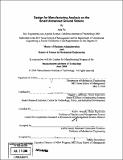Design for manufacturing analysis on the Small Unmanned Ground Vehicle
Author(s)
Yu, Ada (Ada Cheuk Ying)
DownloadFull printable version (12.45Mb)
Other Contributors
Sloan School of Management.
Advisor
Daniel E. Whitney and Roy E. Welsch.
Terms of use
Metadata
Show full item recordAbstract
iRobot is responsible for delivering the Small Unmanned Ground Vehicle (SUGV) as part of the U.S. Army's Future Combat Systems (FCS) initiative. With increasing external competition and pressures, iRobot must deliver an innovative robot while reducing costs, improving quality, and shortening the product's time to market. Since 100% of iRobot's manufacturing is outsourced, the SUGV manufacturing team must optimize its mechanical design in order to help ensure a smooth handoff between its design team and its contract manufacturer. To achieve this goal, the SUGV manufacturing team utilized a Design for Manufacturability and Assembly (DFMA) analysis to simplify components, reduce assembly steps, and improve processes. This paper describes the benefits of DFMA and the tools and techniques used in conducting this analysis. By studying mechanical assemblies, reviewing design drawings with the engineers, and gathering best practices from other industries, this paper provides recommendations for design changes on the SUGV and organizational strategies that can help improve iRobot's product development process.
Description
Thesis (S.M.)--Massachusetts Institute of Technology, Dept. of Mechanical Engineering; and, (S.M.)--Massachusetts Institute of Technology, Sloan School of Management, 2008. Includes bibliographical references (p. 65).
Date issued
2008Department
Massachusetts Institute of Technology. Department of Mechanical Engineering; Sloan School of ManagementPublisher
Massachusetts Institute of Technology
Keywords
Mechanical Engineering., Sloan School of Management.